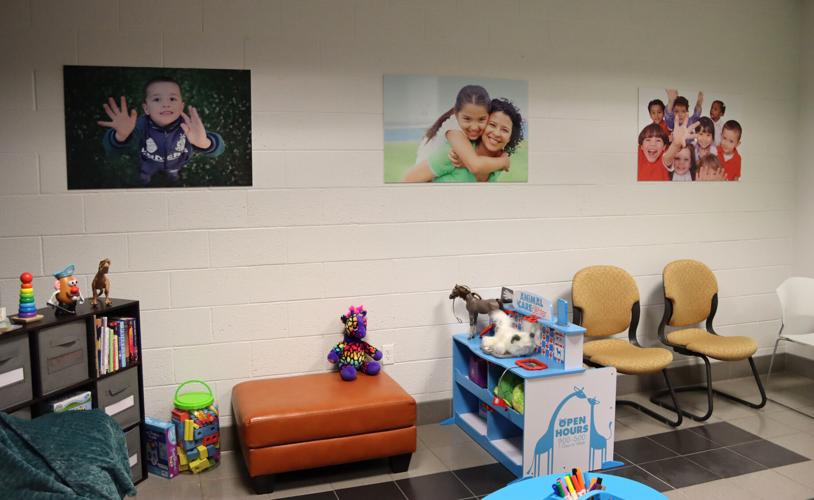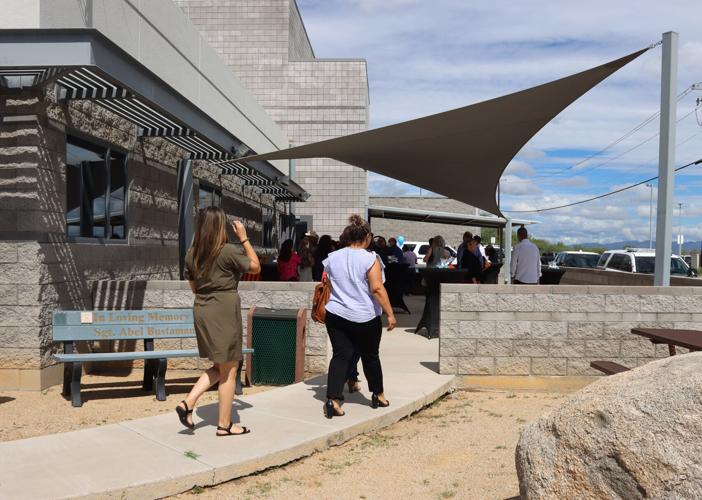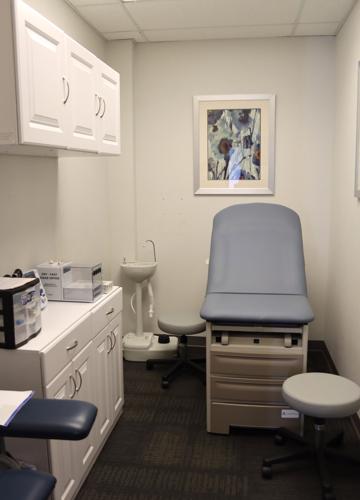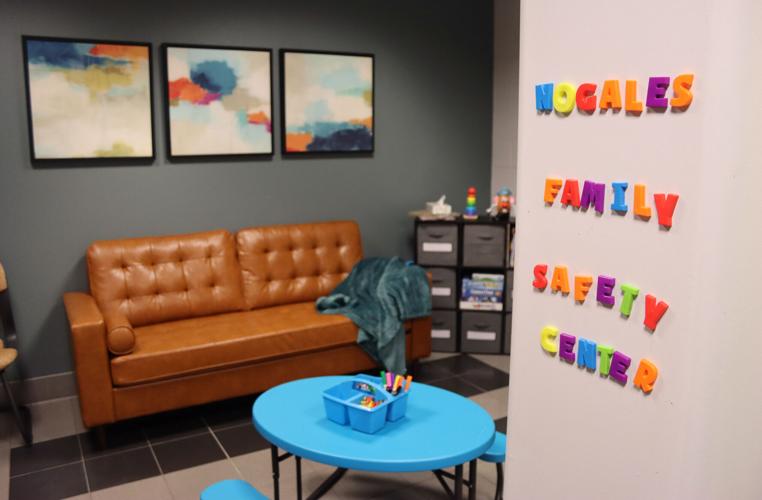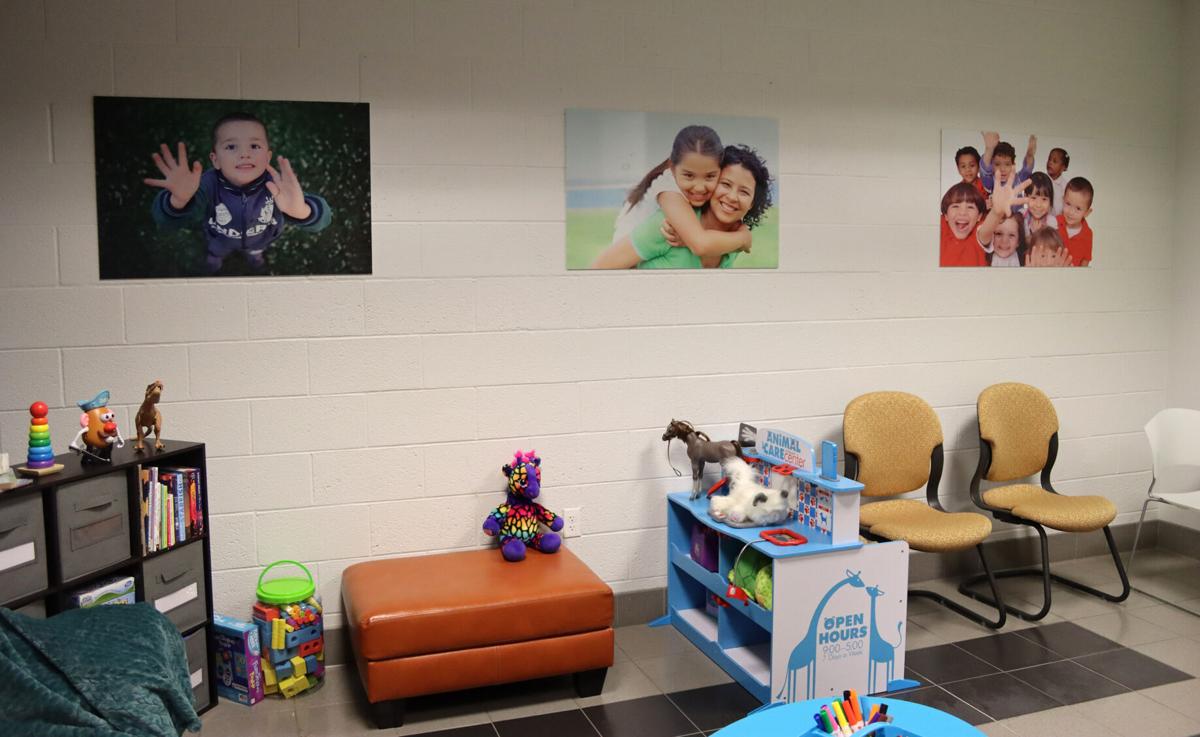Survivors of family and interpersonal violence in Tucson often have to retell their story and relive their trauma as they seek various services from providers across town.
But local stakeholders are hoping to streamline and improve this process, as they explore the idea of creating a one-stop service hub in Pima County. This idea has been executed in other locations across the country, most recently in Nogales, Arizona, this summer.

Family advocacy or justice centers primarily serve survivors and witnesses of child abuse, elder abuse, domestic violence, stalking, harassment and other related crimes. They provide services for survivors, including housing and legal assistance, trauma-informed counseling, victim advocacy, medical care and more all under one roof. Some include law enforcement, and some operate independently.
In June, representatives from the Tucson Police Department, Pima County Sheriff's Department, Children's Advocacy Center of Southern Arizona, Pima County Attorney's Office, Arizona Children's Association and Pima County Behavioral Health visited a family advocacy center in Richmond, California. For the past few years, members of these and other groups have engaged in conversations about creating a similar center in Pima County, but for now, the project is still in the concept phase.

The Nogales Family Safety Center serves as a one-stop location for all survivors of crime, one official said.
A one-stop shop
The Pima County Domestic Abuse Coalition — an organization of community service providers, government and law enforcement agencies — has been working for years to improve the landscape for survivors. While the coalition is not prioritizing the creation a family advocacy center at this time, some members of the group believe it presents the best option for survivors.
Marie Fordney of the Children's Advocacy Center of Southern Arizona understands the value of a hub of services. The CAC conducts medical exams, forensic interviews and houses other services for children who are victims or have witnessed a crime.
"We are very aware that children don't live by themselves," Fordney said. "There's a strong intersection of all interpersonal violence. It's all happening at the same time in a lot in homes in our community. It feels so unfair to me that it’s the victim or survivor that has to go and seek out services and has to travel from one place to the next."
Advocacy or justice centers eliminate that added travel.
"We're really good at collaboration in this community, but it's kind of like a relay race. There's a hand-off (to other providers,) but still the client has to go from one place to the other," she said. "They have to repeat the intake process and often have to tell again what happened and why they're looking for help in the first place."
Some advocacy centers have food stamp offices and staff to help with Medicaid or Medicare enrollment.
While there are many organizations in town to assist crime victims, they each specialize in their own areas, making expanding their services difficult, Fordney said.
"We could build every organization up so they're each doing everything, but I think that saying, 'jack of all trades, master of none' is really true," she said. "Our organization is really good at servicing children, but we're not going to be good at serving adult victims of domestic abuse."
Fordney says she was an early adopter of the idea of bringing a family advocacy center to Pima County, adding that when she hears about a great idea that's backed by evidence, she wants to do it here.
Fordney called the centers "one-stop shopping," saying that if there's a time for convenience, ease and victim-centered, trauma-informed care, "this is it." She said the current system in Pima County is "siloed and fractured" and that it would be a disservice to the community to keep doing things the same way.
Hurdles to overcome
In March, the University of Arizona's Southwest Institute for Research on Women published its Pima County Domestic Violence Community Needs Assessment, which surveyed 47 domestic violence survivors and nine service providers about existing services, unmet needs and their thoughts on a family advocacy center model. Service providers included crisis, legal and housing advocacy, law enforcement, case management and community programs.
Feedback from survivor focus groups indicated that while most were aware of some local services, almost all needed additional assistance or needed services that were unavailable to them due to lack of capacity or eligibility issues, according to the report.
About two-thirds of survivors surveyed said they tried to use services and had a positive but unsuccessful experience or had a negative, unsuccessful experience.

The primary focus on opening the Nogales Family Safety Center was to bring much-needed medical services to the area, one official said.
In terms of unmet needs, participants identified affordable legal representation and access to a safe place to live as the most prominent, with crisis response intervention and affordable long-term counseling also listed.
The assessment found that almost all survivors liked the idea of a family advocacy center that could provide a range of services in a single location, and many speculated that the model might help decrease the number of times a survivor had to tell their story.
"It's hard to want to go to multiple places and keep reliving and retelling the story," one survey participant said, adding that more coordination could make the initial process easier.
But others surveyed wondered how the family advocacy model could work amid capacity limitations with staff and funding.
Providers had similar concerns, but many agreed that having critical services in one space would be very helpful.
"There are significant benefits to developing a Family Justice Center in Pima County; however, doing so prior to addressing the current system challenges … is premature and will likely stretch limited funds even further," the report said. Those challenges include capacity and accessibility of services, a well-trained workforce, organizational shifts and a well-developed community response.
The assessment made several other recommendations, including increasing capacity and scope of services for survivors; educating law enforcement, service providers, attorneys and the judicial system of the complexities of domestic violence and structural inequalities; building up community collaboration among providers; and prioritizing survivor safety.
"When only certain agencies, law enforcement officers or court officials operate from a survivor-centered approach, the entire system is negatively impacted," the report said.
Getting to the other side
Tucson Police Department's Lt. James Brady and Assistant Chief Kevin Hall called the concept of a center in Pima County a community-driven project.
"It's about helping survivors of these type of incidents recover from their trauma, get to the other side of that and be safe," Brady said. "This is not a law enforcement project. Not all survivors want to see prosecution. But being able to help them manage their trauma and the impact that experience has had on them is of huge value."
Brady said that while Tucson and Pima County have many great resources for survivors, the challenge for many is identifying what they need. In this regard, co-locating services would better support survivors in the short and long run, Brady said.
"If you take down the barriers, you're more likely to keep people engaged in services," Brady said.
In addition to the site visit in Richmond, California, the team has also toured advocacy centers in Nashville and the Phoenix area. They also have engaged with survivors to talk about what it would mean to have a single place to go for help.
Hall said that the feedback from many survivors was that the service delivery in Pima County feels "fractured and uncoordinated."
The Family Justice Center in Richmond is one of three locations in Contra Costa County that offer coordinated services and resources for victims of interpersonal violence. The family justice model in Contra Costa is a partnership between nine law enforcement agencies, eight public agencies and 46 community partners.
In 2001, the Contra Costa County Board of Supervisors established a "Zero Tolerance for Domestic Violence" initiative, creating a small fee on vital records to help create a related office within the county administrator's office.
A decade later, the Richmond Police Department opened the first family justice center, operated out of a small police substation in a retail plaza space. At the time, the department was led by former Tucson Police Chief Chris Magnus.
In 2015, the center moved into a vacant, county-owned building in the city's Civic Center area, where it remains. The same year, Contra Costa opened a second family justice center, and in 2019, a third. The center became a nonprofit in 2016. It offers legal services, housing assistance, counseling and peer support and more.
In 2015, the first year in its new location, the Richmond center served 1,127 families. By 2018, that number had jumped to 3,074 families and in 2021, 5,254 families used the center's services.
"I like this model a lot because I'm a big fan of collective impact and bringing a whole lot of different people together to collaborate and break down silos and fix things," Hall said. "It's client-centered and the client voices are listened to and are heard. That adds a level of credibility to the center."

Noemi Elizalde, the mobile advocacy program coordinator for the Children's Advocacy Center of Southern Arizona, said: "It’s been 15 years since there were any (sexual assault nurse examiner) services in Santa Cruz County, and even that was all within the local hospital. There was no advocacy, just the medical exam, back in the day."
One of the primary barriers to survivors seeking help is the belief that they have to involve law enforcement, Brady said.
An independent family advocacy center could help with that by either placing a physical barrier between services and police, or have no police presence at all. This would help send the message that the primary goal is to support survivors, Brady said.
"We're open to conversations around we won't even be there if it meets the needs of the community," Brady said. "If they want to talk to the police, we can respond."
In the long term, a family advocacy center could also help with prevention. Research has shown that early intervention in childhood trauma can drastically improve a person's life. By addressing the root causes of interpersonal violence through family therapy and programs to address food or housing insecurity, real change could be possible 10 to 15 years down the road, Hall said.
"It's an investment in community health," he said. "I see this as the ability to address these social issues in both the short- and long-term capacity."
Fulfilling a need
The Nogales Family Safety Center opened in Santa Cruz county on July 29, serving as a one-stop location for all survivors of crime, said Noemi Elizalde, the mobile advocacy program coordinator for the Children's Advocacy Center of Southern Arizona.
The primary focus of the project was to bring much-needed medical services to the area, Elizalde said.
"It’s been 15 years since there were any (sexual assault nurse examiner) services in Santa Cruz County, and even that was all within the local hospital," she said. "There was no advocacy, just the medical exam, back in the day."
But recovering from trauma involves more than just medical care, Elizalde said.
"It’s the entire healing portion of helping survivors get through the process and move forward," she said. "We're all aiming for the end goal of helping the survivor and helping the family through the process."
Under the first phase of the project, the center, which is housed in the Santa Cruz County Sheriff's Office, is open for services on Tuesday. But if a victim needs services other days of the week, law enforcement, the Department of Child Safety and Elizalde can all be available.
Appointments at the center can be made through law enforcement or DCS, with forensic interviewers and medical providers from the Children's Advocacy Center traveling to Nogales every Tuesday. Representatives from Mariposa Community Health Center's medical advocacy center provide victim advocacy services as needed.
"Utilizing services that are already available is the key to all this working out," Elizalde said. "We don't want to make up a new program just to have it on-site, but rather everyone coming together."
Before the center opened, victims would have to travel to Tucson with a law enforcement representative, a process that often took all day.
"It's really about the ease of access of having all these services available for families," Elizalde said. "Having the safety of being home and close to home, I know they're so excited. We'll be in walking distance away for any questions they may have."
Phase 2of the project will involve building a large center to house the existing services and more.
"This was a long time coming, but the amazing unity this community has is just incredible," Elizalde said. "We're all pieces of the puzzle to helping the entire family as a whole. We can all work together and make it happen."


